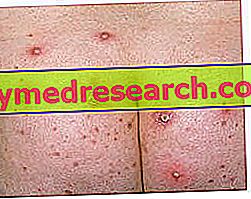What are
Solar supplements are products specially formulated to strengthen the defenses of skin exposed to the sun and promote an intense and lasting tan . Their use is in fact able to support from the inside the protection conferred by the outside through the application of cosmetics equipped with sun filters.

Effects of the Sun
Benefits and Risks of Sun Exposure
Exposing yourself to the sun gradually and with the necessary precautions allows you to take advantage of the beneficial effects that sunlight is able to exert on our body.
First of all, ultraviolet radiation favors the photosynthesis of vitamin D, necessary for a correct mineralization of the bones, as it intervenes in the regulation of calcium and phosphorus metabolism.
Produced in the skin by the action of ultraviolet rays (UV) starting from 7-dehydrocholesterol, colecalciferol (vitamin D3) is an indispensable element for the development and strengthening of the skeleton. Without forgetting that vitamin D is a regulator of the immune response .
Sunlight has a positive effect on the body also relieving rheumatic pains and stimulating the release of brain neurotransmitters, such as serotonin and dopamine, which act as natural " antidepressants ", promoting good mood and regulating sleep patterns.
In addition to giving the skin a warmer shade, then, the sun stimulates the production of some antioxidant and protective substances at the skin level, with a certain filtering activity against the same UV radiation. Furthermore, moderate exposure works by improving certain dermatological diseases, such as acne, eczema, seborrheic dermatitis and psoriasis.
To learn more: Heliotherapy - Treat yourself with sunlight
However, the flip side of the coin is not missing, that is the damages that can arise from an excessive sun exposure . Not adequately protecting the skin, in fact, means incurring in a series of photobiological reactions responsible for harmful effects, both acute (erythema, burns and photosensitivity reactions) and chronic (increased risk of developing skin tumors).
The ultraviolet rays also have the ability to generate free radicals, responsible for the oxidative stress that promotes premature skin aging.
The synergistic action of external photoprotection ( sun creams ) and internal ( supplements ) turns out to be, therefore, fundamental to make the sun an ally of our wellbeing and to avoid that exposure can cause serious health problems.
Indications
For some time now there has been widespread awareness of the potential damage that can result from inadequate or excessive sun exposure, such as premature photo-aging and carcinogenesis.
The first step to a healthy tan is to protect the skin by applying a sunscreen, as recommended by all dermatologists. The shielding capacity of these cosmetics is indicated by a number preceded by an abbreviation (SFP or SPF), considering that a very high sun protection factor is 50+.
To learn more, see: Sun Protection - How to Choose It
A useful contribution to preparing the skin for tanning in advance is the use of solar supplements . These products based on beta-carotene, plant extracts and vitamins are specifically designed to prepare the approach to the sun in the summer season.
These products also help activate skin defenses and limit damage caused by the sun, both immediate and late. This is possible thanks to the mix of substances useful for improving photoprotection and countering the harmful effects of ultraviolet rays, such as carotenoids (including beta-carotene, astaxanthin, lycopene and lutein), vitamins (A, C and E) and trace elements (such as zinc, selenium, copper and magnesium).
Solar supplements are especially recommended for those who have a very fair complexion ( phototype I and II ), to prepare the skin for the sun and prevent the onset of skin rashes, burns and intolerances. These food supplements are also ideal for people who for various reasons (health problems, work activities, etc.) have not exposed themselves to the sun for a long time, as they support the metabolism of the skin that must adapt to the intense radiation of the summer season.
Please note
The use of solar supplements alone can certainly not work miracles. To be effective, tanning supplements must be taken as part of a healthy diet and must always be used in synergy with traditional sunscreens.
It must be remembered, in fact, that a food supplement cannot "compensate" for any incorrect behavior: even for those who regularly take a solar supplement it is important to expose themselves in the less hot hours of the day and to use the right protection based on their phototype.
Benefits
Potential Benefits of Solar Supplements
Solar supplements contain functional substances useful for improving the response to the sun and reducing oxidative damage . If we consider exposure to ultraviolet rays as a potential stressor, in fact, the use of a complement for tanning can be useful for activating melanin and enhancing natural skin protection mechanisms .
In particular, the supplements for tanning would be valid in:
- Strengthen the self-defenses of the skin from the harmful effects induced by ultraviolet rays;
- Stimulating the synthesis of protective skin pigments, such as melanin;
- Promote the formation of collagen and the maintenance of a normal and tanned skin;
- Protect the skin from the harmful action of reactive oxygen species (free radicals);
- Reduce the possible inflammatory reaction associated with excessive sun exposure, such as edema, redness and blistering;
- Prevent photoinduced skin aging (photoaging).
If used in combination with cosmetics that protect the skin, reflecting and / or attenuating radiation thanks to the activity of sun filters, the supplements for tanning are therefore a valid aid to obtain an intense complexion and keep it longer.

Promotional Content

Protects the Beauty of the Skin - Even Summer
Synergy of Unique, Enhanced and Clinically Proven Active Principles. Also useful in summer, it helps the skin to defend itself from the harmful effects of excessive sun exposure «More information»
Ingredients
What do Solar Supplements contain?
Dietary supplements to promote tanning generally occur as capsules or tablets, to be taken orally.
Their formula contains substances with antioxidant power and stimulates the synthesis of melanin, such as vitamins C and E, lycopene and beta-carotene, which promote skin pigmentation and protect cells from oxidative stress.
In general, three categories of solar supplements can be distinguished:
- Melanin stimulators : the "pro-tan" active ingredients, such as tyrosine (precursor of melanin) and carotenoids, optimize the beneficial effect of the sun's rays, making the melanin produced by the skin (the pigment responsible for tonality and skin color) more available. tan intensity). Thanks to solar supplements, the increased production of melanin can help make the coloring of the skin more uniform and long-lasting, as well as promoting more effective protection against UV radiation.
- Based on beta-carotene : precursor of vitamin A, which is able to stimulate the synthesis of collagen and melanin, in addition to defending the skin from sunburn. Solar supplements based on this carotenoid are the most suitable when a more intense tan is desired.
- Antioxidants : molecules such as flavonoids, resveratrol, alpha-lipoic acid, lutein and lycopene help protect the skin from oxidative damage induced by the sun and increase resistance to prolonged or extreme exposures, so they can help prevent erythema, the appearance of dark spots and the tendency to wrinkle formation.
Tanning and sun protection food supplements may also contain:
- Vitamin C (L-ascorbic acid), Vitamin A (retinol) and Vitamin E (alpha-tocopherol): they have an anti-oxidant power, they are effective in counteracting any complications related to excessive exposure to sunlight and contribute to making the compact and luminous skin, in addition to restoring vitality to the complexion and slowing the effects of time. These vitamins, in fact, make the skin more resistant to injuries, enhance the production of melanin and reduce any post-exposure inflammatory states.
- Vitamin PP (nicotinamide): it is particularly useful for those suffering from skin hypersensitivity caused by the sun and helps to reduce superficial inflammation in cases of erythema.
- Selenium: protects against free radicals and helps prevent skin aging, especially when it works in synergy with vitamin E. In addition, this trace element has an effective anti-aging action, supported by its ability to stimulate collagen synthesis and to preserve the elasticity of the tissues.
- Copper: promotes normal pigmentation and protects cells from oxidative stress.
- Zinc: contributes to cellular regeneration of the skin.
- Collagen: it is a protein that gives tone and resistance to epidermal tissue. This component binds to water and increases skin hydration, making it appear smooth and velvety. In solar supplements, the presence of collagen helps to make the skin compact and bright, in addition to restoring vitality to the complexion.
- Coenzyme Q10 : acts against the oxidative processes of collagen, hindering the formation of wrinkles and keeping the skin compact and elastic; this element is also useful for preventing sunburn.
- Essential fatty acids from animal sources (such as omega 3 and 6 ) or plant products (such as evening primrose oil and borage ): they help maintain good hydration of the skin and preserve the integrity of dermis structures.
dosage
When and for how long to take Solar Supplements
Solar supplements should be taken daily at least one month before the period in which exposure to the regular sun is expected and in the two weeks immediately following.
For example, in anticipation of the summer holidays, the ideal would be to start using the product from April to May, continuing until the period (inclusive) in which the holidays are scheduled. Solar supplements can be used if the destination is in a seaside resort or in a mountain location. Moreover, it is possible to take these food supplements also in the city or if you practice a sport in the open air.
In any case, it is important to remember again that the use of supplements does not in any way replace the application of sunscreen with a medium-high protection factor during exposure.
Side effects and contraindications
In most cases, solar supplements are formulated with clinically proven active ingredients that have no significant side effects.
However, in the case of pathologies and pharmacological therapies, it is advisable to consult your doctor before taking it, which can confirm that there are no possible contraindications and possible interactions.
This particular attention must also be paid to children and women during pregnancy and lactation.
In any case, it should be remembered that food supplements must not be taken in doses higher than those indicated on the label, established to perform specific physiological effects.
Supply
To learn more: Food and Tanning
Solar supplements and the role of food
Food supplements should be considered as an additional factor (and not as a substitute) for a varied and balanced diet, which can provide all the nutrients the body needs. This general rule also applies to specific products for tanning: sun supplements must be taken when necessary, when the physiological effects on the label can "optimize" one's well-being.
As is known, nutrition is a factor that strongly affects a person's health. During the summer season, a healthy diet is able to prepare the skin for the first exposure to the sun and helps maintain a healthy tan .
The foods best suited to preserving the skin from the dangers of solar radiation, which should not be missing from the table, are green, yellow, red and orange vegetables, such as carrots, spinach, lettuce, chicory, radicchio and peppers. tomatoes, strawberries, cherries and apricots. Melons, oranges, berries, whole grains, fish and oil seeds (including walnuts, almonds and hazelnuts) are also useful foods to keep the skin healthy and promote a tan.
Furthermore, it is important to always remember to replenish the fluids that are lost by exposing yourself to the sun, drinking a lot of water. In fact, properly preserving the correct state of hydration means maintaining the beauty of the tan .



